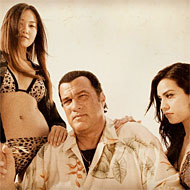
A funny thing happened while we watched Robert Rodriguez’s latest Mexploitation flick, Machete, last week. A strange, unfamiliar feeling came over us, as the film’s portly drug-dealer villain Torrez lumbered onto the screen. At first we thought we were mistaken, but pretty soon it became undeniable: We were actually enjoying a Steven Seagal performance. And not just sort of enjoying it in an ironic way, but really enjoying it. Sporting a ridiculous Mexican accent, brandishing Japanese sabers, with half-naked (and in some cases, naked-naked) Asian women draped all over him, Seagal was not only funny, he was actually kind of self-deprecating. For once, he seemed to be in on the joke. And it wasn’t long before we began to think “comeback.” But this in turn led to some complicated soul-searching on our part. Because Steven Seagal, over the years, has not proven himself to be an easy guy to like.
True, eighties action stars have been experiencing a renaissance of sorts recently, so perhaps it was only a matter of time before Seagal’s reputation was revamped, along with Messrs. Stallone, Lundgren, and Co. But Seagal — who walked away from The Expendables because of a previous feud with producer Avi Lerner — never quite fit in with the rest of those characters. He didn’t have the star power of Stallone and Schwarzenegger at their peaks. Nor did he have the physical prowess or, um, flexibility of Jean-Claude Van Damme (to say nothing of JCVD’s camp affability), or the All-American, working-man appeal of Chuck Norris. Yeah, he was an aikido master (or so we were told), but there was something creepy about this guy: the oily ponytail; the squinty, stone-faced non-acting; the faux-Asian spiritual mumbo jumbo; the lumbering presence that betrayed the seal-like shape he would take in later years. He seemed like an impostor in the action-movie pantheon.
Plus, he always took himself way too seriously. Even his best film, 1992’s legitimately awesome Die Hard–on-a-hijacked-navy-ship thriller Under Siege, made us cringe with its attempts to portray Seagal as a hunky man of the people — remember the gross final scene, where he busts a move on Erika Eleniak while a ship full of Navy men cheer him on? There was a brief glimmer of hope in 1996’s Die Hard–on-a-hijacked-plane thriller, Executive Decision, in which a top-billed Seagal allowed himself to get killed in the film’s first act. But even that was played seriously, and besides, it was Kurt Russell’s movie. And don’t even get us started on the whole reincarnated-Buddhist-master thing.
In later years, as his films have gone straight-to-DVD, Seagal’s career has taken even more bizarre turns, with his attempt at a musical career in the mid-aughts and the recent reality-TV show Steven Seagal: Lawman, which halted production after the stone-faced lawman himself was hit with allegations (now dismissed) of sexual trafficking. That wasn’t the first time Seagal had found himself in legal trouble: Back in 2002, he was implicated in a conspiracy with shady L.A. “detective to the stars” Anthony Pellicano to intimidate a journalist who was reportedly digging into Segal’s possible Mafia connections. Seagal was never charged, and the resulting investigation (and months-long Hollywood scandal) focused on Pellicano’s many criminal activities on behalf of his famous clients. Seagal had always tried to present a whiff of real-life danger to his persona — he even hinted once that he did some work for the CIA back in the day — but these sordid allegations made it even harder to think of him fondly.
What’s sad is that, on some level, Seagal should have been easier to like: While Schwarzenegger and Stallone were promoting Reaganite militarism and Dolph Lundgren was making movies for imprisoned right-wing lobbyist Jack Abramoff, Seagal’s films dared to strike progressive poses: His squinty, whispery, lone-wolf heroes often fought on behalf of the environment, or Native American tribes, or even animal rights. Unfortunately, he looked downright goofy while doing so: Anyone who saw On Deadly Ground won’t soon forget the film’s finale, in which Seagal’s character addresses the Alaska State Legislature about the evils of the oil industry. (Reportedly, the speech was originally fifteen minutes long and had to be cut down on the studio’s insistence.) The message itself is a compelling one; too bad it’s delivered by a creepy fat dude in a ridiculous tan-buckskin jacket.
Which would make it even cooler if Machete were to turn Seagal’s career around. Because Robert Rodriguez’s film also happens to be a politically pointed action flick, one in which the real bad guys are a bunch of overtly anti-immigrant scuzzbuckets. It’s a fine example of how to make a political point with action and humor — a lesson that Seagal somehow never learned, until now.


